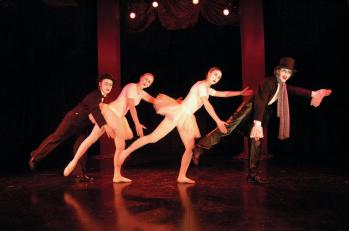
The Globe Theatre was founded in 1966 by Ken and Sue (Richmond) Kramer, who were inspired by their involvement in Brian Way's theatre for children in London, England. Introduced as Saskatchewan's first professional theatre since 1927, it was also one of Canada's earliest and most visionary theatres devoted to young audiences. Functioning as a touring company with a province-wide mandate, it gradually increased grants from the Saskatchewan Arts Board, the Canada Council, and the Department of Education, until its 1975-76 season covered a 20,188 km school touring circuit including 142 towns, 290 performances over 32 weeks, and an audience of 80,894 students and adults - or 9% of the provincial population and one-third of its school-aged children. The philosophy behind the company emphasized participation and access for all young people regardless of their location, economic means or initial interest in theatre. The early school repertoire featured the work of Brian Way; but in 1972 Rex Deverell began writing plays for the young people's company, and in 1975 the Globe formally established a writer-in-residence position (the first theatre to do so in western Canada) which he would hold for fifteen years (Canada's record for the longest serving playwright-in-residence).
Beginning in 1967, the Kramers also mounted individual shows for adults, and after two short seasons provided through the Regina Public Library they formally extended the theatre's mandate to include an adult season of six plays in 1970. Tragedy struck the theatre in 1978 when Sue Kramer died after a battle with cancer, but under Ken Kramer's ongoing artistic direction it maintained an audience of approximately 10% of the provincial population. After a variety of temporary spaces, in 1981 the Globe moved into Regina's old City Hall and a new 400-seat arena theatre unique among regional theatres in Canada. Within a year subscriptions soared to 5,652 (97% capacity), and in 1984 the theatre received the Vantage Arts Academy Award for the high calibre of its professional work and its contribution to the Canadian theatre scene. Having begun with a budget of $10,000, by 1985 the Globe had a $1 million budget - 36% of which is derived from box office receipts. The adult season initially toured to five locations in southern Saskatchewan, so Kramer's sets and costumes remained modest despite the fact that the repertoire regularly included both period classics such as Shakespeare and modern classics. However, the Kramer years have become best known for the numerous new plays premiered by writers such as Carol Bolt, Ken Mitchell, Rod Langley, Len Peterson and especially Rex Deverell. Rooted in the region's populist culture, many of these works responded directly to the immediate social and political concerns of the theatre's audience, and together with the school tour repertoire they provided many actors with stepping stones to successful careers.
Susan Ferley took over as Artistic Director in 1989. In the first year she managed to eliminate a substantial deficit she had inherited; but because of cuts in available grants she struggled to maintain the school tours, and eventually went to touring only on alternating years with a radically reduced circuit, which in 1995-96 encompassed only fifty-seven communities and seventy-seven performances over nine weeks. However, she was able to secure funding to initiate one of Kramer's long-term ambitions: a second stage satellite series for new dramatic work whose form or content had a more limited appeal than the main stage programming. Although without a writer-in-residence after 1990, Ferley featured new work by Gail Bowen and provided modest commissions to encourage new work by other local writers, such as Greg Nelson's Speak and Ken Mitchell's The Great Electrical Revolution. During her term, the theatre secured the patronage of His Royal Highness Prince Edward - the first and only time he had bestowed patronage in Canada - and in 1994 it hosted its first royal visit.
In 1997, Ruth Smillie succeeded Ferley as Artistic Director. A successful capital campaign begun by Ferley enabled the Globe to complete over $1 million worth of renovations, including improvements to its second stage space. The school tour was finally dropped completely, increasing emphasis being placed on the family Christmas show (40% of box office revenue) and school matinees (which in 2003 accounted for more than twice the revenue of 1998). With a production budget that has more than doubled since 1998, Smillie has placed greater emphasis on set and costumes than her predecessors. Operating grant revenue has remained reasonably stable at around $600,000, but box office and corporate revenue have risen to approximately 55% of a $2 million budget in 2003-04. Smillie has featured Floyd Favel's new work, in particular his Governor of the Dew, which played before Prince Edward's second visit to the Globe in 2003. Current initiatives include renovations to accommodate a theatre school, something that had been part of the Theatre's early mandate before its suspension in 1980.
Mary Blackstone
Print EntryHOME | BROWSE BY SUBJECT | ENTRY LIST (A-Z) | IMAGE INDEX | CONTRIBUTOR INDEX | ABOUT THE ENCYCLOPEDIA | SPONSORS TERMS OF USE | COPYRIGHT © 2006 CANADIAN PLAINS RESEARCH CENTER, UNIVERSITY OF REGINA | POWERED BY MERCURY CMS |
|||
| This web site was produced with financial assistance provided by Western Economic Diversification Canada and the Government of Saskatchewan. |
|||
 |
 |
 |
 |
| Ce site Web a été conçu grâce à l'aide financière de Diversification de l'économie de l'Ouest Canada et le gouvernement de la Saskatchewan. |
|||